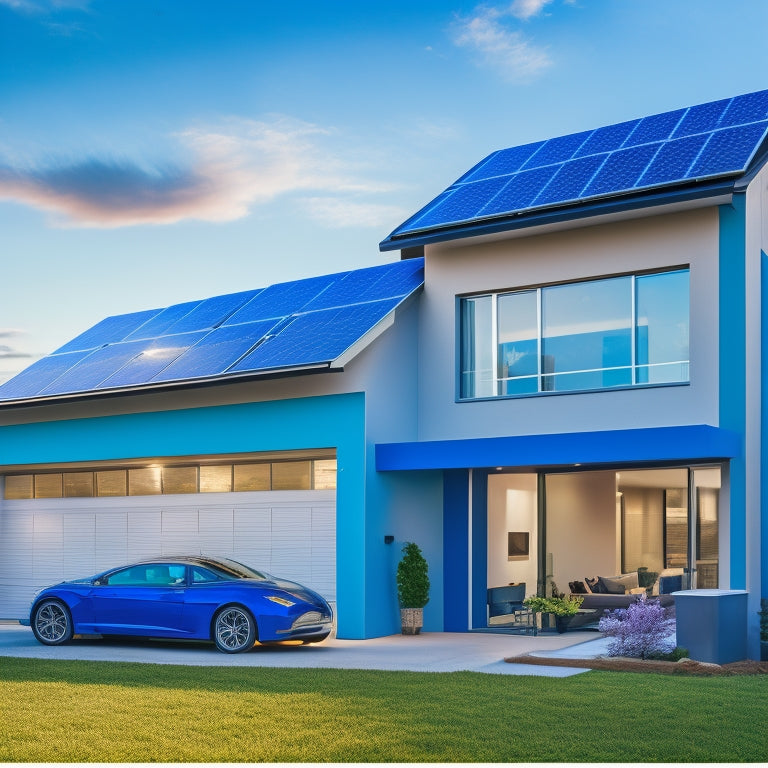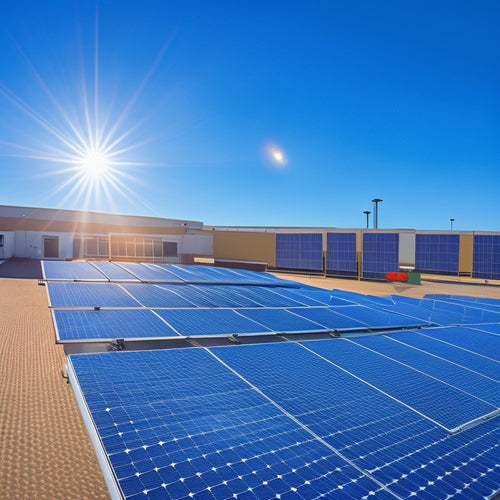
What Are the Best Online Solar Battery Backup Systems?
Share
You're searching for a reliable online solar battery backup system that integrates seamlessly with your solar panels. Top brands like Tesla, LG, and Sonnen offer innovative solutions with varied products to suit different needs and budgets. When evaluating systems, consider capacity, voltage, and amp-hour rating, as well as battery chemistry and integration with your electrical infrastructure. You'll also want to assess monitoring and control capabilities. To find the best fit, evaluate system reliability, battery life, and charging cycles, as well as manufacturer warranties and customer support. Now, explore further to uncover the ideal system for your specific needs.
Key Takeaways
• Reputable brands like Tesla, LG, and Sonnen offer innovative solar battery backup systems with varied products to suit different needs and budgets.
• Evaluate key features such as capacity, voltage, and amp-hour rating, as well as battery chemistry and system integration when selecting an online solar battery backup system.
• Consider cost factors including the type and quality of components, battery capacity, and overall energy efficiency when choosing a solar battery backup system.
• Look for online reviews that assess system reliability, battery life, and charging cycles, as well as manufacturer warranties and customer support.
• Choose a system that integrates seamlessly with solar panels, has advanced home automation features, and includes built-in safety features like overcharge protection.
Top Solar Battery Backup Brands
When selecting a solar battery backup system, you'll likely encounter several prominent brands that dominate the market, each offering unique features, benefits, and pricing structures. As you navigate the options, it's important to prioritize quality and performance. A thorough brand comparison is important to make sure you're investing in a reliable system that meets your energy needs.
Brand reputation, warranty, and customer support are key factors to keep in mind. Look for brands with a proven track record of delivering high-quality products and exceptional customer service. Quality matters, and a reputable brand will provide assurance that your system will perform efficiently and last longer.
Top brands like Tesla, LG, and Sonnen are known for their innovative solutions and commitment to quality. They offer a range of products with varying capacities, features, and price points to cater to different needs and budgets.
Key Features to Consider Online
As you research online, you'll want to evaluate solar battery backup systems based on several key features that impact performance, efficiency, and cost-effectiveness. During your online research, consider the system's capacity, voltage, and amp-hour rating to make sure it meets your energy needs.
Look for systems with high-depth-of-discharge (DOD) ratings, as they can provide more usable energy. Additionally, consider the type of battery chemistry, such as lithium-ion or lead-acid, as it affects the system's lifespan and maintenance requirements.
System integration is also essential, as it determines how seamlessly the solar battery backup system integrates with your existing electrical infrastructure. Check if the system is compatible with your existing solar panel setup and if it supports multiple charging sources, such as grid, solar, or generator power.
Moreover, evaluate the system's monitoring and control capabilities, ensuring you can track performance, receive alerts, and adjust settings remotely.
Solar Panel Battery Cost Factors
You'll typically find that the cost of a solar panel battery backup system is largely driven by the type and quality of its components, with the battery itself being the most significant expense. The cost of the battery can vary greatly depending on its capacity, chemistry, and manufacturer. A higher-capacity battery, for instance, will generally cost more than a lower-capacity one. Additionally, batteries from reputable manufacturers with advanced energy storage technologies may come at a premium.
When evaluating the cost of a solar panel battery backup system, it's essential to consider the overall energy efficiency of the system. A more efficient system will provide better investment returns in the long run. Look for systems with high round-trip efficiency (RTE) ratings, as they'll waste less energy during charging and discharging.
Furthermore, consider the warranty and maintenance costs associated with the system, as these can impact the total cost of ownership. By carefully evaluating these cost factors, you can make an informed decision that balances upfront costs with long-term energy savings and investment returns.
Online Backup System Reviews Compared
Comparing online backup system reviews from various manufacturers and industry experts can help you pinpoint the best fit for your energy needs and budget. You'll want to evaluate the System Reliability of each system, considering factors like battery life, depth of discharge, and charging/discharging cycles.
Online Security is also an important aspect, as you'll be storing sensitive information about your energy usage and potentially vulnerable to cyber threats. Look for systems with robust encryption, secure data transmission, and regular software updates.
When reading reviews, pay attention to the manufacturer's warranty and customer support. A thorough warranty can provide peace of mind, while responsive customer support can help you troubleshoot issues quickly.
Additionally, consider the scalability of the system, as your energy needs may change over time. Some systems may be more adaptable to upgrades or expansions than others.
Best Battery Backup for Homes
When selecting the best battery backup for your home, consider a system that integrates seamlessly with your existing solar panel setup and provides a reliable, long-lasting power supply during outages or emergencies. You'll want a system that offers advanced Home Automation features, allowing you to monitor and control your energy usage remotely. This will give you the flexibility to optimize your energy consumption and maximize your Energy Independence.
Look for a system with a high-capacity battery that can store excess energy generated by your solar panels during the day, and provide a reliable power source at night or during grid outages. A scalable system that can be expanded as your energy needs grow is also essential.
Additionally, consider a system with built-in safety features, such as overcharge protection and thermal management, to secure safe and efficient operation.
Frequently Asked Questions
Can I Install a Solar Battery Backup System Myself?
When considering a DIY installation, you'll face DIY challenges, such as ensuring proper electrical connections, and safety concerns, like preventing electrical shock and fire hazards, so it's important to weigh the risks before deciding to install a solar battery backup system yourself.
Are Solar Battery Backup Systems Compatible With Grid-Tie Systems?
You'll be relieved to know that solar battery backup systems can seamlessly integrate with grid-tie systems, ensuring grid interoperability through system integration, energy synchronization, and power compatibility via AC coupling, allowing for efficient energy flow.
Can I Use a Solar Battery Backup System for RVS and Boats?
You can definitely use a solar battery backup system for RVs and boats, enabling off-grid adventures and marine applications, providing reliable power for your journeys, while also ensuring a safe and efficient energy supply.
Do Solar Battery Backup Systems Come With a Warranty?
You'll be relieved to know that most solar battery backup systems come with a warranty, typically ranging from 5 to 10 years, which covers defects and guarantees battery durability, giving you peace of mind for your investment.
Can I Monitor My Solar Battery Backup System Remotely?
Did you know 75% of homeowners prioritize remote monitoring for their solar battery backup systems? You can monitor your system remotely through mobile access, enjoying real-time tracking of performance, energy usage, and battery health from anywhere.
Related Posts
-

How to Achieve a Zero-Waste Lifestyle for a Greener Tomorrow
To achieve a zero-waste lifestyle, start by adopting the principles of refusing, reducing, reusing, and recycling. Sw...
-

Replacing Old Appliances With Sustainable Alternatives
Replacing old appliances with sustainable alternatives can change your home into an energy-efficient space. Not only ...
-

Essential Solar Panel Mounts for Commercial Properties
When it comes to essential solar panel mounts for your commercial property, durability and wind resistance are key fa...


